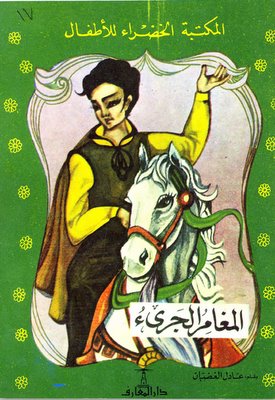 There are few relics of childhood more endearing to me than “Dhahaba al-Lailu,” the whimsical little ditty recounting poor Su-Su’s misadventures, my all-time favourite children’s song. This version is a lovely rendition in Muhammad Fawzi’s melodious voice, complete with the original instrumental overture and the call-and-response with the children’s chorus.
There are few relics of childhood more endearing to me than “Dhahaba al-Lailu,” the whimsical little ditty recounting poor Su-Su’s misadventures, my all-time favourite children’s song. This version is a lovely rendition in Muhammad Fawzi’s melodious voice, complete with the original instrumental overture and the call-and-response with the children’s chorus.Adults of a certain age will remember that the upstart Susu leaves school (sab madrastu), throws away his notebook (rama kurastu), and spends his time pulling the cat’s tail. Of course, he gets his hand scratched by the cat, and Muhammad Fawzi underlines the moral in case we’ve missed it: that’s what happens to someone who doesn’t heed every word that Mama utters. But alas, Susu’s mischief doesn’t end there. Fifi is upset with Susu so he tries to make up with her and gives her a kiss on the cheek, but she swears she won't kiss him back. Instead, she dips her fingers in ink and smears his face. Susu gets angry, hits her, and spills the ink all over her dress. Baba intervenes to end the mayhem and hits them both. The ditty ends on a more comforting note of children growing up and pursuing gainful employment in the professions.
I can’t really take “Dhahaba al-Lailu” seriously as a tool of social control, how could I with such a poetic opening: “Night is gone, dawn emerges, the bird chirps (saou saou!), and the cat meows (naou! naou!)” It’s one of the many works of art that graced my childhood, along with the fanciful tales of the Green Library (al-Maktaba al-Khadra). I notice only now the Platonic mission of the series. As its publishers write on the back cover, “These are stories treasured by every boy and girl…they enrich youngsters, uplift their souls, and guide them to the path of beauty and the good.”
For Karim Ramy Karam, a bold adventurer unhampered by parental social controls, as he treads his first steps on the path of beauty and the good.
